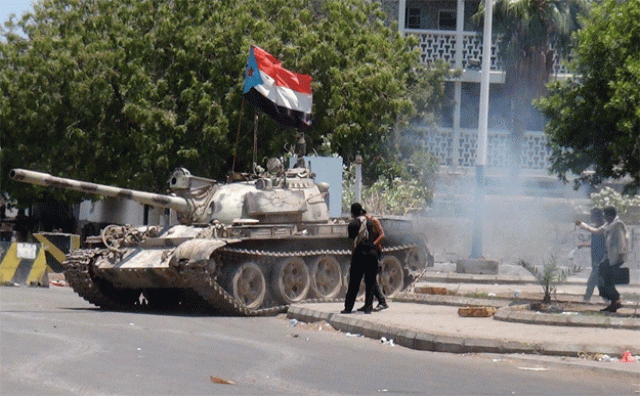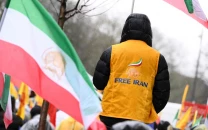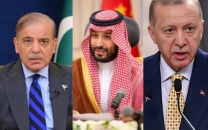Will of parliament: ‘Stay out of Yemen conflict’
Unanimous resolution backs govt’s commitment to protect Saudi territory

Unanimous resolution backs govt’s commitment to protect Saudi territory. PHOTO: AFP
After a marathon debate on Riyadh’s request for Pakistan to join the military coalition against Houthi rebels in Yemen, federal lawmakers asked the government on Friday with one voice to stay out of the conflict in the Arabian Peninsula, but backed its commitment to protect Saudi Arabia’s territory which is currently under no threat.
Defence Minister Khawaja Asif had told lawmakers in a joint session of parliament, which began on April 6, that the Saudis have asked for Pakistani troops, ships and warplanes to join the Gulf states’ coalition seeking to quell the Houthi insurrection against President Abd Rabbuh Mansur Hadi’s rule.
For five days lawmakers from all parliamentary parties debated the issue. None of them, however, endorsed the idea of jumping into the fray militarily and warned the government of serious implications it might accrue. Conversely, they called for Pakistan to play a mediatory role.
Initially, there were reports that the government might not bring in a resolution to seek parliament’s backing for joining the Saudi military coalition given the cynical response from lawmakers. But, according to sources, the change of heart took place Friday morning after Prime Minister Nawaz Sharif gave an in-camera briefing to all parliamentary leaders on the Yemen issue.
Subsequently, Finance Minister Ishaq Dar presented a resolution in the house which was unanimously passed. The 12-point resolution called upon the government to begin work in the UN Security Council and the Organisation of Islamic Cooperation (OIC) to bring about a ceasefire in the strife-torn region.

Point No 10 won applause from the treasury benches which says parliament “expresses deep concern at the increasing threats posed by different terrorist groups and non-state actors to the security and stability of the region and advises the government of Pakistan to enhance its friendship and cooperation with the Gulf Cooperation Council and all other regional countries in combating extremism and terrorism”.
The resolution notes that “the war in Yemen is not sectarian in nature but has the potential of turning into a sectarian conflict, which will have critical fallout in the region, including Pakistan”.
While Dar read out point No 6 of the resolution, MQM lawmaker Rehan Hashmi asked him to replace the word ‘Yemen’ with the ‘region’ but the finance minister declined his request, saying that the current conflict is in Yemen.
Dr Shireen Mazari of the PTI claimed that the political parties expunged many points that the Foreign Office and the government wanted to incorporate into the resolution. Key politico-religious leaders Sirajul Haq, the Jamaat-e-Islami Ameer, and Maulana Fazlur Rehman, head of his eponymous faction of Jamiat Ulema-e-Islam, hailed the resolution as a ‘good precedent’.
Point No 5 says that parliament “apprehends that the crisis in Yemen could plunge the region into turmoil”. The house also underscored the “need for continued efforts by the government of Pakistan to find a peaceful resolution of the crisis, while promoting the unity of Muslim Ummah, in cooperation with the leaders of other Muslim countries.
After its initial positive response to a Saudi request for joining the military coalition, the government in Islamabad found itself in an awkward position as all opposition parties opposed the idea and instead asked for clarity on the issue.
Pakistan has deep military and religious ties to Saudi and has long benefited from the oil-rich kingdom’s largesse. But it has been reluctant to become ensnared in a conflict with sectarian ov ertones. Moreover, the Pakistani military is stretched thin, maintaining a heavy presence on the border with India as well as fighting against Taliban militants in the tribal regions.
Apparently, Prime Minister Nawaz was happy with the outcome of the parliament’s session. He spent some time interacting with leaders of other parties after Speaker Ayaz Sadiq prorogued the session. PTI chief Imran Khan and Interior Minister Chaudhry Nisar Ali Khan were conspicuous by their absence from Friday’s proceedings.
Imran’s PTI was the only party that presented its own draft on the Yemen crisis during the parliamentary parties’ meeting. Dr Mazari said the Foreign Office wanted the line “Pakistan should maintain neutrality in the Yemen conflict” not be included in the draft – but the PTI opposed it.
Interestingly, it was Defence Minister Khawaja Asif who had given the policy statement on the Yemen situation in parliament – but the resolution was presented by his cabinet colleague Ishaq Dar. Dr Mazari said her party had asked the government to exclude Asif from drafting and presenting the resolution.
Asif had invited PTI’s ire after he launched a frontal attack on the party on the first day of parliament’s session for its ‘politics of agitation’.
Published in The Express Tribune, April 11th, 2015.



















COMMENTS
Comments are moderated and generally will be posted if they are on-topic and not abusive.
For more information, please see our Comments FAQ